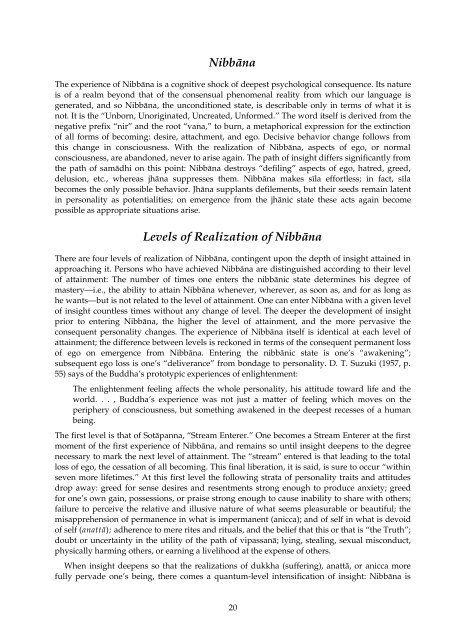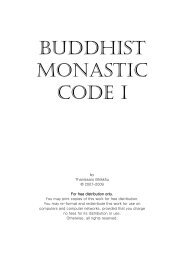THE BUDDHA W MEDITATION - Theravada Buddhism
THE BUDDHA W MEDITATION - Theravada Buddhism
THE BUDDHA W MEDITATION - Theravada Buddhism
Create successful ePaper yourself
Turn your PDF publications into a flip-book with our unique Google optimized e-Paper software.
Nibbāna<br />
The experience of Nibbāna is a cognitive shock of deepest psychological consequence. Its nature<br />
is of a realm beyond that of the consensual phenomenal reality from which our language is<br />
generated, and so Nibbāna, the unconditioned state, is describable only in terms of what it is<br />
not. It is the “Unborn, Unoriginated, Uncreated, Unformed.” The word itself is derived from the<br />
negative prefix “nir” and the root “vana,” to burn, a metaphorical expression for the extinction<br />
of all forms of becoming: desire, attachment, and ego. Decisive behavior change follows from<br />
this change in consciousness. With the realization of Nibbāna, aspects of ego, or normal<br />
consciousness, are abandoned, never to arise again. The path of insight differs significantly from<br />
the path of samādhi on this point: Nibbāna destroys “defiling” aspects of ego, hatred, greed,<br />
delusion, etc., whereas jhāna suppresses them. Nibbāna makes sīla effortless; in fact, sīla<br />
becomes the only possible behavior. Jhāna supplants defilements, but their seeds remain latent<br />
in personality as potentialities; on emergence from the jhānic state these acts again become<br />
possible as appropriate situations arise.<br />
Levels of Realization of Nibbāna<br />
There are four levels of realization of Nibbāna, contingent upon the depth of insight attained in<br />
approaching it. Persons who have achieved Nibbāna are distinguished according to their level<br />
of attainment: The number of times one enters the nibbānic state determines his degree of<br />
mastery—i.e., the ability to attain Nibbāna whenever, wherever, as soon as, and for as long as<br />
he wants—but is not related to the level of attainment. One can enter Nibbāna with a given level<br />
of insight countless times without any change of level. The deeper the development of insight<br />
prior to entering Nibbāna, the higher the level of attainment, and the more pervasive the<br />
consequent personality changes. The experience of Nibbāna itself is identical at each level of<br />
attainment; the difference between levels is reckoned in terms of the consequent permanent loss<br />
of ego on emergence from Nibbāna. Entering the nibbānic state is one’s “awakening”;<br />
subsequent ego loss is one’s “deliverance” from bondage to personality. D. T. Suzuki (1957, p.<br />
55) says of the Buddha’s prototypic experiences of enlightenment:<br />
The enlightenment feeling affects the whole personality, his attitude toward life and the<br />
world. . . , Buddha’s experience was not just a matter of feeling which moves on the<br />
periphery of consciousness, but something awakened in the deepest recesses of a human<br />
being.<br />
The first level is that of Sotāpanna, “Stream Enterer.” One becomes a Stream Enterer at the first<br />
moment of the first experience of Nibbāna, and remains so until insight deepens to the degree<br />
necessary to mark the next level of attainment. The “stream” entered is that leading to the total<br />
loss of ego, the cessation of all becoming. This final liberation, it is said, is sure to occur “within<br />
seven more lifetimes.” At this first level the following strata of personality traits and attitudes<br />
drop away: greed for sense desires and resentments strong enough to produce anxiety; greed<br />
for one’s own gain, possessions, or praise strong enough to cause inability to share with others;<br />
failure to perceive the relative and illusive nature of what seems pleasurable or beautiful; the<br />
misapprehension of permanence in what is impermanent (anicca); and of self in what is devoid<br />
of self (anattā); adherence to mere rites and rituals, and the belief that this or that is “the Truth”;<br />
doubt or uncertainty in the utility of the path of vipassanā; lying, stealing, sexual misconduct,<br />
physically harming others, or earning a livelihood at the expense of others.<br />
When insight deepens so that the realizations of dukkha (suffering), anattā, or anicca more<br />
fully pervade one’s being, there comes a quantum-level intensification of insight: Nibbāna is<br />
20






